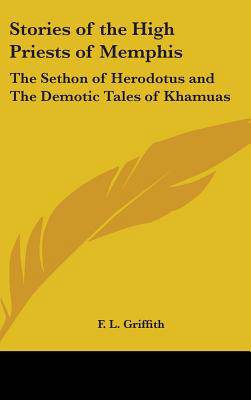
- Afhalen na 1 uur in een winkel met voorraad
- Gratis thuislevering in België vanaf € 30
- Ruim aanbod met 7 miljoen producten
- Afhalen na 1 uur in een winkel met voorraad
- Gratis thuislevering in België vanaf € 30
- Ruim aanbod met 7 miljoen producten
Zoeken
Stories of the High Priests of Memphis
The Sethon of Herodotus and The Demotic Tales of Khamuas
F Llywellyn Griffith
Hardcover | Engels
€ 56,95
+ 113 punten
Uitvoering
Omschrijving
""Stories of the High Priests of Memphis: The Sethon of Herodotus and The Demotic Tales of Khamuas"" is a book written by F. L. Griffith. The book delves into the ancient Egyptian city of Memphis and its high priests, exploring two important texts: ""The Sethon of Herodotus"" and ""The Demotic Tales of Khamuas"". The first text, ""The Sethon of Herodotus"", is a historical account of the reign of King Sethos I and his son Ramses II, as recorded by the Greek historian Herodotus. The second text, ""The Demotic Tales of Khamuas"", is a collection of folktales and legends from the same time period, which were written in the demotic script. The book provides a detailed analysis of both texts, examining their historical and cultural significance, as well as their literary value. It also includes translations of the original texts, along with commentary and notes to aid in understanding. This book is a must-read for anyone interested in ancient Egyptian history, literature, or culture.1900. F. L. (Frances LLewellyn) Griffith is the editor of these two demotic stories. Demotic, a term first used by Herodotus, is both a stage of the ancient Egyptian language and the script used to record the language. The aim of scholars was to demonstrate the value of demotic texts for the study of Ptolemaic and Roman Egyptian social and cultural history.This scarce antiquarian book is a facsimile reprint of the old original and may contain some imperfections such as library marks and notations. Because we believe this work is culturally important, we have made it available as part of our commitment for protecting, preserving, and promoting the world's literature in affordable, high quality, modern editions, that are true to their original work.
Specificaties
Betrokkenen
- Auteur(s):
- Uitgeverij:
Inhoud
- Aantal bladzijden:
- 220
- Taal:
- Engels
Eigenschappen
- Productcode (EAN):
- 9781432605827
- Verschijningsdatum:
- 1/12/2004
- Uitvoering:
- Hardcover
- Formaat:
- Genaaid
- Afmetingen:
- 152 mm x 229 mm
- Gewicht:
- 494 g

Alleen bij Standaard Boekhandel
+ 113 punten op je klantenkaart van Standaard Boekhandel
Beoordelingen
We publiceren alleen reviews die voldoen aan de voorwaarden voor reviews. Bekijk onze voorwaarden voor reviews.











